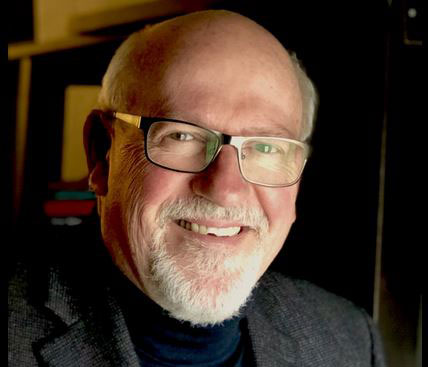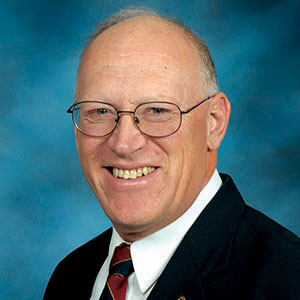Kansas Profile – Now That’s Rural: Rick McNary, Shop Kansas Farms
June 3, 2020
By Ron Wilson, director of the Huck Boyd National Institute for Rural Development at Kansas State University.
A Kansas man was almost overwhelmed by a flood. But it wasn’t a flood of water, it was a flood of interest – specifically, an interest in finding local foods. Now that interest is helping build connections that are benefitting farmers and consumers across the state.

At right: Rick McNary | Download this photo.
Rick McNary is a writer, photographer, global hunger expert and founder of a remarkable new Facebook group known as Shop Kansas Farms. For 20 years, he served as a pastor of a church in Potwin, Kansas. After going on a mission trip and interacting with starving people in Nicaragua, he organized a humanitarian food relief organization. Today, he is still involved in such efforts through The Outreach Program, a non-profit that organizes food packaging events across the country.
Rick has published three books. Many of his articles have been published in Kansas Farm Bureau’s Kansas Living magazine.
Then the coronavirus hit. “One night I was sitting in my recliner, talking to my wife Christine,” Rick said. “We had just had a delicious supper of beef which we had gotten from our friends Kregg and Katie Carothers in Harper County, but Christine told me that she had been to the store and the meat counter was empty."
That meant there was a disconnect between the people raising beef and the consumers who were looking for it in the store. Rick wondered if social media might provide a way to connect local producers and consumers.
“I didn’t know much about Facebook groups but I thought I would give it a try,” Rick said. He created a group called Shop Kansas Farms on Facebook. That night he checked on the group and was startled to see how many people had already joined.
“Oh my,” he said. “Then I checked the next morning, and it was, `Holy cow!’” The interest in the group took off.
“I felt like a little kid who was walking along a dam and saw a strange object, which happened to be a plug, and pulled on it, unleashing a pent-up flood of water behind it,” Rick wrote. In four weeks, the Shop Kansas Farms Facebook group went from zero to more than 130,000 members.
Many producers were posting about their products, and many consumers were asking about them. Products included vegetables, beef, pork, cheese, honey, lavender and more.
“I’m so thankful that some friends stepped in as administrators and moderators to help manage the group,” Rick said. These included social media expert Olivia Fletcher, Meagan Cramer of Kansas Farm Bureau, Kansas Department of Agriculture staff and others.
“It’s a crazy idea that has taken off,” Rick said. Interest is so great that a Shop Kansas Farms website is being created so that people can search specifically for producers in their region.
“We want to help farmers prosper,” Rick said. “When a farmer tells me that he thought they were going to have to fold, and now they’re making money, that’s meaningful. This is creating new opportunities and people are becoming friends of farmers again.”
The project is making a difference. It’s quite an accomplishment for someone from the rural community of Potwin, population 449 people. Now, that’s rural.
After the first three weeks, Rick posted his thoughts about this phenomenon, including the following observations:
“A local and regional community is being built around agriculture. Consumers are learning real-time about how agriculture works…Rural revitalization is taking place. People want to buy local. In the previous food chain, the average calorie traveled 1,500 miles to reach our plates. Now, people are purchasing food from as close as their next-door neighbor. This is a movement. Already, these types of “Shop Our State Farms” are springing up around America as people follow this model. I believe this movement will continue long after the COVID-19 crisis.”
It was a flood – a flood of interest in local foods. Rick McNary is now gratified by the results. He wrote about those who have helped with the Facebook group: “They have channeled the tumultuous waters into a life-giving river that is providing education, connection, commerce, behavior standards, new friendships, and most of all, hope.”
Audio and text files of Kansas Profiles are available at http://www.kansasprofile.com. For more information about the Huck Boyd Institute, interested persons can visit http://www.huckboydinstitute.org.
-----------
The mission of the Huck Boyd National Institute for Rural Development is to enhance rural development by helping rural people help themselves. The Kansas Profile radio series and columns are produced with assistance from the K-State Research and Extension Department of Communications News Media Services unit. A photo of Ron Wilson is available at http://www.ksre.ksu.edu/news/sty/RonWilson.htm. Audio and text files of Kansas Profiles are available at http://www.kansasprofile.com. For more information about the Huck Boyd Institute, interested persons can visit http://www.huckboydinstitute.org.


